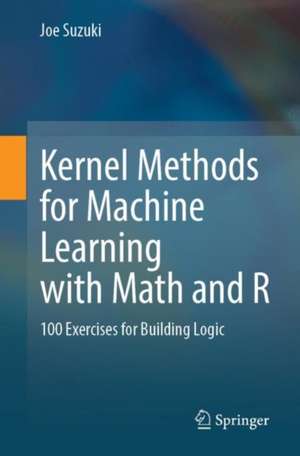Kernel Methods for Machine Learning with Math and R: 100 Exercises for Building Logic
Autor Joe Suzukien Limba Engleză Paperback – 4 mai 2022
The book’s main features are as follows:
- The content is written in an easy-to-follow and self-contained style.
- The book includes 100 exercises, which have been carefully selected and refined. As their solutions are provided in the main text, readers can solve all of the exercises by reading the book.
- The mathematical premises of kernels are proven and the correct conclusions are provided, helping readers to understand the nature of kernels.
- Source programs and running examples are presented to help readers acquire a deeper understanding of the mathematics used.
- Once readers have a basic understanding of the functional analysis topics covered in Chapter 2, the applications are discussed in the subsequent chapters. Here, no prior knowledge of mathematics is assumed.
- This book considers both the kernel for reproducing kernel Hilbert space (RKHS) and the kernel for the Gaussian process; a clear distinction is made between the two.
Preț: 299.63 lei
Preț vechi: 374.54 lei
-20% Nou
Puncte Express: 449
Preț estimativ în valută:
57.34€ • 59.64$ • 47.34£
57.34€ • 59.64$ • 47.34£
Carte tipărită la comandă
Livrare economică 14-28 aprilie
Preluare comenzi: 021 569.72.76
Specificații
ISBN-13: 9789811903977
ISBN-10: 9811903972
Pagini: 196
Ilustrații: XII, 196 p. 32 illus., 29 illus. in color.
Dimensiuni: 155 x 235 mm
Greutate: 0.3 kg
Ediția:1st ed. 2022
Editura: Springer Nature Singapore
Colecția Springer
Locul publicării:Singapore, Singapore
ISBN-10: 9811903972
Pagini: 196
Ilustrații: XII, 196 p. 32 illus., 29 illus. in color.
Dimensiuni: 155 x 235 mm
Greutate: 0.3 kg
Ediția:1st ed. 2022
Editura: Springer Nature Singapore
Colecția Springer
Locul publicării:Singapore, Singapore
Cuprins
Chapter 1: Positive Definite Kernels.- Chapter 2: Hilbert Spaces.- Chapter 3: Reproducing Kernel Hilbert Space.- Chapter 4: Kernel Computations.- Chapter 5: MMD and HSIC.- Chapter 6: Gaussian Processes and Functional Data Analyses.
Notă biografică
Joe Suzuki is a professor of statistics at Osaka University, Japan. He has published more than 100 papers on graphical models and information theory.
He is the author of a series of textbooks in machine learning published by Springer.
- Statistical Learning with Math and R
- Statistical Learning with Math and Python
- Sparse Estimation with Math and R
- Sparse Estimation with Math and Python
- Kernel Methods for Machine Learning with Math and R (This book)
- Kernel Methods for Machine Learning with Math and Python
Textul de pe ultima copertă
The most crucial ability for machine learning and data science is mathematical logic for grasping their essence rather than relying on knowledge or experience. This textbook addresses the fundamentals of kernel methods for machine learning by considering relevant math problems and building R programs.
The book’s main features are as follows:
- The content is written in an easy-to-follow and self-contained style.
- The book includes 100 exercises, which have been carefully selected and refined. As their solutions are provided in the main text, readers can solve all of the exercises by reading the book.
- The mathematical premises of kernels are proven and the correct conclusions are provided, helping readers to understand the nature of kernels.
- Source programs and running examples are presented to help readers acquire a deeper understanding of the mathematics used.
- Once readers have a basic understanding of the functional analysis topics covered in Chapter 2, the applications are discussed in the subsequent chapters. Here, no prior knowledge of mathematics is assumed.
- This book considers both the kernel for reproducing kernel Hilbert space (RKHS) and the kernel for the Gaussian process; a clear distinction is made between the two.
Caracteristici
Equips readers with the logic required for machine learning and data science Provides in-depth understanding of source programs Written in an easy-to-follow and self-contained style
